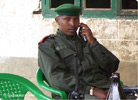
When I first met dissident General Laurent Nkunda, Chairman of the National Congress for the Defense of People, or CNDP, in February 2008, I was also introduced to his Chief of Staff, Bosco Ntaganda. Large and tall with searing hazel eyes and wearing a red beret, Ntaganda talked to me for several minutes. He asked me about my nationality, my religious background and my age. I answered his questions while nodding and smiling, but my stomach was churning and my brain was racing.
At that time, Bosco Ntaganda had a sealed International Criminal Court arrest warrant for war crimes he committed in Ituri province in 2002 and 2003 as Chief of Military Operations for the Union of Congolese Patriots, or UPC. Ntaganda enlisted, conscripted and actively used children under the age of 15 in combat. It was also during the conflict in Ituri that Ntaganda gained his nickname “the Terminator” (See Enough’s latest Congo strategy paper for a more detailed profile of this bad actor).
When the warrant for his arrest was unsealed in April 2008, Ntaganda was consequently no longer found at the side of General Nkunda or near the flashing lights and the continuous hum of CNDP’s media machine. Many guessed he would disappear permanently from the spotlight.
But now, thanks to collaborative efforts between the governments of Congo and Rwanda, “the Terminator” is back. Chosen as the military commander to spearhead joint Congo and Rwanda operations against the Rwandan-affiliated Hutu militia, the FDLR, in eastern Congo, Bosco is the talk of Goma, the capital of North Kivu province. Rumors of suitcases full of cash changing hands are rife, as we are seeing rapidly changing allegiances on the ground.
Me, I’m a bit distracted. I’m still trying to comprehend how Congo and Rwanda thought it was a good idea to pick an indicted war criminal to lead the charge against a militia most famous for its complicity in the Rwandan genocide. Congo ratified the Rome Statute of the International Criminal Court in 2002 and should be helping to turn Bosco over to The Hague — rather than relying on him to lead military operations. It’s appalling that the Rwandan government, which has made the push for justice and due process a key part of its international diplomacy, would welcome Bosco as an ally.
More disturbingly, as the Congolese government escorts Ntaganda to press conferences when they should be taking him to the ICC, the international community has had very little to say about this turn of events. Where is the outrage? Perhaps the international community is taking Ntaganda’s word that he is on a quest for peace. Of course, this is the same guy who, back in 2002, insisted that his child soldiers were simply “orphans” whom he was helping look after.

